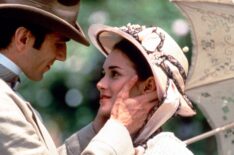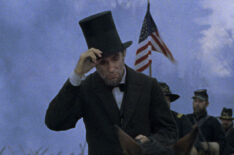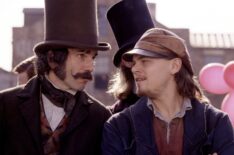Daniel Day-Lewis

Actor
Birth Name: Daniel Michael Blake Day-Lewis
Birth Date: April 29, 1957
Age: 68 years old
Birth Place: London, England, UK
Spouses: Rebecca Miller
Partners: Isabelle Adjani
Unpredictable and famously reserved about his private life to the point of being secluded, actor Daniel Day-Lewis proved time and again his considerable onscreen talents in roles befitting the highly complex actor. Though often compared to fellow Brit Laurence Olivier, Day-Lewis instead took his cues from the raw, aggressive loners of 1970s American cinema, namely Marlon Brando and Robert De Niro, in adapting a Method-style of acting.
After gaining notice with his performances in "My Beautiful Laundrette" (1985) and "The Unbearable Lightness of Being" (1988), Day-Lewis developed a reputation for fully delving into his characters, often to the point of making their experiences his own - like staying in a wheelchair all day and being spoon fed like the real-life Christy Brown, the Irish writer and painter with cerebral palsy, in "My Left Foot" (1989). While he may have learned to track animals to play a frontiersman in "Last of the Mohicans" (1993) and lived in a prison cell to play an accused IRA bomber in "In the Name of the Father" (1993), it was highly doubtful Day-Lewis turned into a savage murderer for his Oscar-nominated turn as Bill the Butcher in "Gangs of New York" (2002).
Nonetheless, Day-Lewis' focus on craft was palpable onscreen - again evidenced in his acclaimed leading performance in "Lincoln" (2012) - earning him yet another Oscar and the respect of all actors for being one of the most deeply committed thespians of his generation. Famously conflicted about life as a thespian, Day-Lewis claimed that "Phantom Thread" (2017), his second film with "There Will Be Blood" (2007) director Paul Thomas Anderson, would be his last movie.
Born on April 29, 1957 in London, England, Day-Lewis was raised in a middle-class literary home; his father, Cecil, was a writer and English Poet Laureate from 1968 until his death in 1972, and his mother, Jill Balcon, was an actress. Surprisingly, his parents sent him to public school in South London, rather than have their son educated at a posh academy. But Day-Lewis proved to be a rambunctious student, leading his parents to transfer him to Sevenoaks, a private school in Kent.
His new surroundings made him miserable; he even went on a shoplifting spree in hopes of getting expelled, but to no avail. Instead, Day-Lewis begged his parents to let him join his sister, Tamasin, at Bedales, a progressive public school in neighboring Petersfield.
Part of his dilemma with fitting in at private school came from his identifying with the working class, despite an educated middle class upbringing. He was intrigued by other kids whose fathers worked the shipping yards or ran shops. Despite his troubles, it was at this time that Day-Lewis was introduced to his two most prominent interests: carpentry and acting.
Though he made his film debut with a tiny role in "Sunday, Bloody Sunday" (1971), an emotionally complex drama about an unorthodox love triangle, it would be a number of years before he graced the big screen with regularity. Meanwhile, prior to his death in 1972, his father had the happy opportunity to see his son play Florizel in a production of Shakespeare's "A Winter's Tale." He soon died, leaving behind a lifetime of regret in Day-Lewis for not having had a close relationship with his father.
In 1973, Day-Lewis joined the National Youth Theatre, but found the experience to be degrading and soon left. Meanwhile, his desire to be a craftsman led to applying for an apprenticeship with well-known cabinetmaker John Makepeace. At the same time, however, Day-Lewis applied to the Bristol Old Vic and was accepted. Though he chose to enter acting, he never lost his interest in craftsmanship, even if only translating the principles into building characters.
Meanwhile at the Old Vic, he delivered noted performances in Nigel Williams' "Class Enemy," among others.
Day-Lewis started his film career in earnest with a small part as a street bully in Richard Attenborough's historical epic "Gandhi" (1982). After a supporting role opposite the likes of Mel Gibson, Anthony Hopkins and Sir Laurence Olivier in "The Bounty" (1984), Day-Lewis made his first distinct impression in "My Beautiful Laundrette" (1985), playing a swaggering punk who helps his Pakistani friend (Gordon Warnecke) run a laundromat transformed from a hole-in-the-wall to a sparkling gem, thanks to a shipment of cocaine. Day-Lewis received kudos galore for his brash portrayal of the fascist delinquent Johnny and quickly popped up on all the critics' radar. Soon enough, he followed with another noteworthy performance in "A Room With a View" (1986), playing the foppish and insufferable fiancé of a young British woman (Helena Bonham Carter) struggling between doing what is proper and following her passion. Day-Lewis earned a Best Supporting Actor award from the New York Film Critics Circle.
While building an impressive résumé onscreen, Day-Lewis continued acting on stage, performing in productions of Christopher Bond's "Dracula," Julian Mitchell's "Another Country," as well as turns in "Romeo and Juliet" and "A Midsummer Night's Dream" for the Royal Shakespeare Company. Returning to film, he then tried his hand at screwball comedy with "Stars and Bars" (1988), a miserable box office dud that showcased Day-Lewis as a proper English art dealer who goes to rural Georgia to purchase a Renoir from a country bumpkin (Harry Dean Stanton), only to run into competition after the son (Maury Chaykin) makes a deal with a rival dealer. He returned to form, however, with a strong performance as a philandering Czech doctor visiting the West who struggles with the decision whether or not to return to his wife behind the Iron Curtain in "The Unbearable Lightness of Being" (1988), Philip Kaufman's meditative look at love and existence through sensuality. Day-Lewis' scenes with co-stars Lena Olin and Juliette Binoche made him a sex symbol virtually over night.
Perhaps Day-Lewis' greatest artistic achievement arrived in the form of "My Left Foot" (1989), his first collaboration with director Jim Sheridan, in which he played famed Irish writer and painter Christy Brown, who was born with cerebral palsy and reached his full potential with the undying resolve of his unassailable mother (Brenda Fricker). Only able to control his left foot, Brown suffered through years of neglect from his family, who thought him helpless and mentally deficient. But with the help of his mother's undying loyalty - and a piece of chalk - Brown was able to overcome his handicaps to become a respected novelist, poet and painter. To prepare for the physical challenge of playing Brown, Day-Lewis spent eight weeks at a cerebral palsy clinic, and on work days, spent the entire time in a wheelchair in order to experience the frustrations and humiliations of being washed and fed. The intense mental and physical preparation reaped handsome reward. Day-Lewis was widely praised on his way to winning an Oscar for Best Actor at the Academy Awards.
Because of deeply immersing himself into characters - a practice that became his modus operandi throughout the years - Day-Lewis took more time off between projects, presumably to recover from the physically and emotionally draining experiences. So four years after "My Left Foot," Day-Lewis emerged from his self-imposed seclusion to star in Michael Mann's historical epic "The Last of the Mohicans" (1993), a lush, romantic adaptation of James Fenimore Cooper's novel. Day-Lewis played Hawkeye, a European-born frontiersman and adopted son of the Mohican Chingachgook who, along with his tribe, joins forces with the British to fight the French and their Huron allies during the French and Indian War.
Meanwhile, Hawkeye saves Cora Munro (Madeline Stowe) and her sister from a Huron war party, sparking a sizzling romance that only amplified the historical imperative of defeating the French. Once again, Day-Lewis went to extreme lengths to prepare for the role; he learned to track and skin animals, build canoes, throw tomahawks and fire a flintlock rifle which he kept by his side at all times, even at Christmas dinner. Meanwhile, the onscreen chemistry and sexual tension between the two leads was palpable and long remembered by swooning fans years after its release - particularly his passionate promise to save Cora ("You stay alive, no matter what occurs! I will find you!"), intensifying Day-Lewis' status as an iconic sex symbol.
Day-Lewis followed up "Mohicans" with his second and most celebrated collaboration with director Jim Sheridan, "In the Name of the Father" (1993), the gripping saga of Gerry Conlon, a purported member of the infamous Giuldford Four, a group of three Irishmen and an English woman wrongly accused of a 1974 IRA bombing in Guildford, England. After the bombing, Conlon is brutally interrogated and forced to sign a confession despite his professed innocence. He's thrown into prison alongside his aging father (a brilliant Pete Postelthwaite), where Conlon is forced to endure the torments of injustice while trying to rectify his relationship with his dad.
Day-Lewis once again embarked upon a typically intense regimen to prepare for the role; he went on a prison diet in order to achieve Conlon's emaciated look, and to reach the prisoner's emotional state, he spent 48 hours in a prison cell eating slop and having buckets of ice water thrown on him. The result was a deeply powerful and touching performance that earned Day-Lewis critical praise and several award nominations, including his second nod for Best Actor at the Academy Awards.
There was no need to endure gruel or shiver in a 7-by-10 foot cell for his next film, "Age of Innocence" (1993), Martin Scorsese's lush and operatic adaptation of Judith Wharton's biting satiric novel about uptown society in late 19th century Manhattan. Day-Lewis played Newland Archer, a staid and aristocratic lawyer who finds his passions ignited by his fiancée's (Winona Ryder) beautiful cousin, Countess Ellen Olenska (Michelle Pfeiffer). Day-Lewis reunited with Ryder for a well-crafted adaptation of Arthur Miller's "The Crucible" (1996), playing John Proctor, a Salem farmer in 1692, who is afraid of spoiling his good name after his former servant and lover accuses his wife (Joan Allen) of witchcraft.
The actor delivered yet another strong performance steeped in nuance and emotional turmoil. In "The Boxer" (1997), his third collaboration with Jim Sheridan, he played a once-promising Irish boxer who returns to Belfast after serving 14 years in prison for IRA activities. With his hometown mired in violence and hate, he tries to revive his boxing career while rekindling a romance with his former girlfriend (Emily Watson). For his performance, Day-Lewis was nominated for Best Actor - Drama at the Golden Globes that year.
At a time when his career was running on all cylinders, Day-Lewis felt it was time to step back and semi-retire for a few years. He retreated to Italy, where rumors abounded that he turned to shoe-making for his vocation - something Day-Lewis greeted with muted derision when he finally did return to the spotlight after Martin Scorsese cast him in "Gangs of New York" (2002), an epic look at gang violence between Irish immigrants and "natives" of New York in the mid-19th century. At the center of the bloody battle was Bill the Butcher (Day-Lewis), the fierce leader of the natives who kill the leader of the Irish, Priest Vallon (Liam Neeson), sparking his son (Leonardo DiCaprio) to seek vengeance years later by working his way into the leader's inner circle.
Day-Lewis delivered one of his finest performances to date, earning critical kudos from all corners for his dynamic portrayal of a ruthless, but charismatic killer - all but stealing the film from everyone else on the screen. He also racked up a slew of award nominations, including nods for Best Actor at the Golden Globes and Academy Awards.
In "The Ballad of Jack and Rose" (2004), Day-Lewis was a dying man living out his days on the last remnants of a former hippie commune with his isolated daughter (Camilla Belle). But when the father invites his on-again, off-again girlfriend (Catherine Keener) and her two sons to live with them, the once-close relationship with his daughter suddenly deteriorates. Written and directed by Rebecca Miller, the daughter of famed playwright Arthur Miller, "The Ballad of Jack and Rose" came and went without much fanfare.
Meanwhile, Day-Lewis returned to critical acclaim with "There Will Be Blood" (2007), playing a former down-and-out silver miner who becomes a self-made oil tycoon during California's petroleum boom at the beginning of the 20th century. Standing in his way of becoming rich beyond his wildest dreams is a young preacher (Paul Dano), who runs an Evangelical church on ground under which lies an ocean of black gold. Day-Lewis' both heart-warming and vicious portrayal of the oilman earned him a win for Best Actor in a Motion Picture Drama at the 2008 Golden Globes. He followed his victory with a second Academy Award win for Best Performance by an Actor in a Leading Role.
Day-Lewis surprised many with his next major role in "Nine" (2009), Rob Marshall's musical loosely based on Fellini's "8 ½" (1963) that focused on a struggling film director (Day-Lewis) who tries to make a movie while dealing with all the demanding women in his life: his wife (Marion Cotillard), his mistress (Cruz), his star (Nicole Kidman) and even his diseased mother (Sophia Loren). For his work in the film, he received a Golden Globe nomination in a category heretofore foreign to him: Best Performance by an Actor in a Motion Picture - Musical or Comedy.
As had been typical for the actor throughout his career, Day-Lewis stepped away from the limelight and seemingly disappeared. But in 2010, his name resurfaced when news hit that he was cast by Steven Spielberg to play President Abraham Lincoln in the director's epic biopic "Lincoln" (2012), which focused on the conflict between Lincoln and his cabinet members during the last few months of his presidency, which saw both the end of slavery and the conclusion of the Civil War. The role was originally given to Liam Neeson in 2005, but the actor backed out in 2010, feeling that he was too old for the part and opening the door for Day-Lewis, whose performance earned Oscar buzz even before the film's release in November 2012.
He would go on to receive a Best Actor Golden Globe and Academy Award for his portrayal of the president. Taking an even longer break between films than usual, Day-Lewis' next project was "Phantom Thread" (2017), a reunion with "There Will Be Blood" writer/director Paul Thomas Anderson featuring Day-Lewis as a brilliant but difficult women's tailor in London's high fashion world of the 1950s. In June 2017, Day-Lewis announced through a spokesperson that "Phantom Thread" would be his last film, and that the 60-year-old actor planned on retiring.
Credits

Anemone

Anemone

SpielbergStream

Phantom ThreadStream

David Sheehan's Holiday Movie Magic

LincolnStream

Access to the Danger Zone

NineStream
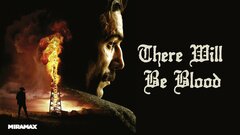
There Will Be BloodStream

The Ballad of Jack and Rose
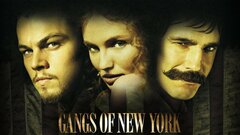
Gangs of New YorkStream

The BoxerStream

The CrucibleStream

The Age of InnocenceStream

In the Name of the FatherStream

The Last of the MohicansStream

My Left FootStream

Eversmile New Jersey
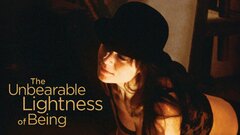
The Unbearable Lightness of BeingStream

Stars and Bars

The Oprah Winfrey Show

Un Cuarto Con Vista

A Room with a ViewStream

The Insurance Man

My Beautiful LaundretteStream

The BountyStream

Entertainment Tonight

How Many Miles to Babylon

Nightline

Good Morning America

Parkinson

60 MinutesStream




